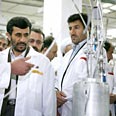
Without enforced significant sanctions, Iran will not divert from its course of becoming a nuclear power. And, without international backing, Israel would be unwise to launch a pre-emptive attack against Iran.
It's unclear whether or not Iran has the capability of launching a nuclear-tipped missile from its territory. It may have acquired the technology for a smaller nuclear devise (thanks to Pakistan and North Korea) mounted on ballistic missiles that could be launched by small groups, or via Hezbollah and Hamas proxies.
The obvious advantage of using a proxy is that it's harder to trace its origins to Iran, and therefore it would offer Iran some protection from retaliation, at least for a while.
This situation severely limits Israel's options. Rather than engaging in irresponsible rhetoric, threats and boasting, the situation requires strategic watchfulness. The deployment of allied missile-equipped ships in the Gulf is a serious commitment. And, as Israel's anti-missile defense improves, chances are good that an incoming missile will be intercepted; that would entitle a response with full force.
Once it achieves nuclear capability, moreover, Iran is also limited. The United States, Britain and France (and other countries) could warn Iran that launching a missile – any missile (since it can be assumed to be a WMD) – against a non-Iranian target would result in a devastating response, perhaps the annihilation of Iran, by a combined international force.
Such a warning to Iran must be clear, unequivocal, and substantive. This would obligate the "Great Powers" including NATO, to become part of a control mechanism that will act decisively. There can be no question about the ramifications of a first-strike launch using WMD.
No ambiguity
The advantage of such a mechanism is that it virtually locks in all participants and everyone knows the rules. Iran's success up to now has been due to the lack of rules, clear red lines and meaningful consequences. The responsibility for prudence and self-preservation as well as the system itself, therefore, is incumbent on every player. And once armed, there is no withdrawal.
Without doubt, Iran, like Pakistan and North Korea will try to distribute and build facilities for WMD, and they may be initially successful, as occurred with Syria. It would appear, however, that these initiatives could be readily eliminated.
Countries that have WMD and threaten others should be ostracized and severely punished. This intervention is included in Chapter VII of the UN Charter, which permits the total economic and political isolation of countries in violation; other international bodies can join this effort. In this way, Iranian nuclear weapons could be a blessing in disguise, if this prompts a new way of thinking about the problem and how to contain it.
The premise of this approach is that having "The Bomb" would include accountability for its use. A step back from confrontation, it is not appeasement or conciliatory. It sends a message of resolve that the initial use of WMD, without provocation, will trigger a devastating response by the international community.
A critical factor, therefore, is not only that Iran, or any other country obtain WMD, but that the international community – especially those in the Security Council – announce emphatically what the use of such terrible weapons will mean. There can be no ambiguity and no doubt about such consequences.
Not only Iran should be the focus, but the countries which allowed this volatile situation to happen and invested in it. Nuclear proliferation may be inevitable, but not necessarily uncontrollable.
Every nation involved in allowing and helping Iran achieve nuclear capabilities has a moral obligation to prevent the production of nuclear weapons and ensure that such weapons will never be used.
As more nations acquire nuclear capability and weapons, they can learn that it's also a responsibility.
Failure to respond effectively to a clear and present danger – appeasement - is moral degeneracy, and self-destructive. One Neville Chamberlain at Munich is enough.
The author is a writer and journalist living in Jerusalem















